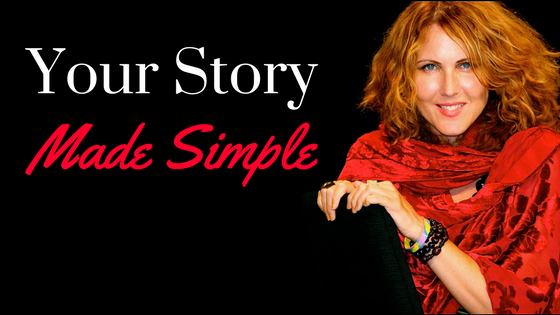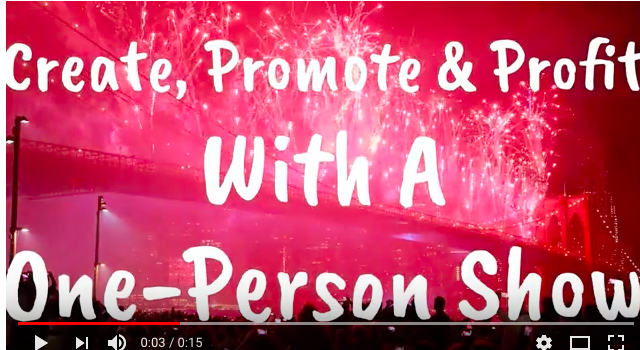You have an idea for a show but have no idea how to get started.
Do you need a director?
Do you need to work with someone in person at a theatre?
Do you need to take classes?
Will it take years?
Maybe you started writing but you lack structure and don’t know how to make your material sooo good that you’ll have producers requesting you to perform!
You’re tired of starting and stopping and then of course…that ugly R shows up. RESISTANCE!
It shows up because you are sharing really personal stuff.
What if you’re judged?
Ummm, you will be…but how you are with the issue is the issue (and that can be changed so that you are confident in your sharing)
What if your mother/father/brother/sister/ son/ daughter/ (fill in the blank) get angry at you for telling the family secrets?
Well, I’ve got answers for all of this for you.

Not only do I have a critically acclaimed one woman show that I’ve performed in 3 countries and 9 states (and counting) and for over 11,000 people – but I’ve worked with dozens of actors/ solo performers and I take them through a process so that they know that sharing their story is not only valuable but it is their right.
Without further ado….let’s get into the 7 steps I’ve honed in on that will take your process from hard and long and circuitous to simple while shaving years off the process.
My intention is to show you that this can be an inspired, creatively expressive and FUN journey that gives you freedom while changing people’s lives.

1. Have a Passionate Message.
This is the foundation that your show is built on. It will keep you going when you are stuck. It’s tied to your BIG WHY?
Why do you have to tell this story? Who will you change? Inspire? Move to Action?
I didn’t start out knowing my message. I found it through years of starts and stops with my writing and finally presenting it to others.
My audience let me know what my message was.
I had an idea (and it took me two years of intense study in the practice of Spiritual Psychology to really get it)
I have a very succinct process to help you KNOW what it is right from the beginning so you don’t have to take so much time away from your project to figure it out.
2. Do Your Inner Work.
This prepares you for your success and so much more.
Resistance will come up as you up-level, are ‘seen’, and become more visible.
There will be challenges.
Our brain literally works on overdrive to keep us small and living the status quo. Well, fuck that!
We are actors, creatives. We have an opportunity to step into our greatness and that takes courage.
Inner work can include
a. Journaling about your process (this is you witnessing YOU) or
b. FREE Form writing (which I learned in my Master’s degree in Spiritual Psychology)I’ve been using it with my clients for years. It’s where you release your emotions in a healthy way (on the pages of your notebook) so you can use your emotions in a clear way in your work.
3. Create a Short Piece/ Uplevel the Piece You Have.
Finishing a short piece and making it brilliant (yes, you can) gives you a sense of accomplishment and teaches you the skills you need to make an amazing full-length show.
Give it your all.
One big mistake I see new writers make is wanting to rush and have the entire show done yesterday. You can do that but it won’t be excellent. It will be general and so you won’t get the results I’m hoping you want…performing on big stages and making a big impact by reaching lots of people

4. Perform/Present Your Material.
There is nothing more valuable than getting feedback from an audience.
You can show your work to a friend (at first), perform in an acting class, present it to a coach, put it up at an open mic, take part in a short play evening in your local area or submit to a fringe festival.
I encourage my clients to move out of only performing in class and to start performing for strangers because there is still a comfort level in a class that isn’t there when you perform in public.
You’ll get ‘real’ feedback on your show, not based on how much you are liked in the class or even because of previous work you’ve done in the class. Your show and your presentation will be taken at face value…which might sound scary but only because it’s the unknown and it’s the place of upleveling, growth and the possibility of miracles.
Someone could see you performing your material at an open mic and invite you to present at another event, right?
5. Rewrite.
You either love it or hate it.
Most people hate the process but LOVE the result.
So I say focus on how much better your material when you’ve done the second, third, fourth draft.
Take some time off between drafts and come back to it.
I’m always shocked about how many new ways I can think of improving my writing- and acting – after I’ve given myself some distance from my project.
I’ve been performing my one-woman show for years.
I took a two year hiatus to focus on teaching others how to create their own shows and when I decided to come back and perform the show I was shocked to find new powerful acting moments- new choices I hadn’t even seen before. It was very fulfilling.
I always encourage getting a second eye on your work…and not just a friend or family member unless they are professional writers/performers.
I attended several top writing classes where I got feedback from professional writers and performers and hired a dramaturg to look at my script.
As I evolved I made changes to my script.
6. Promote the crap out of your show.
Borrowing my son’s favorite word there. But it’s true. A lot of actors and writers get stalled thinking about having to talk about their work.
They want someone else to promote them.
And yes, it’s great to have an agent, a manager, a publicist, a booking agent (know you’ll be paying them too though) but I cannot emphasize enough how you are your BIGGEST Asset when it comes to talking up your show.
After all, this is based on your life and your talent. You are the expert and you will have the most passion for it. And passion is contagious.
There are many different ways to promote your show when you are in production and in between.
Always have postcards and business cards on hand and have a great landing page/website/and/or Facebook Business page to send prospective buyers to.
7. Over-Deliver
Once you have your performance set (whether that be a paid gig or a free gig) give it your best.
Make sure you are spot on with your lines (memorized). One sure sign of being an amateur is thinking you ‘got it’ and can just go with the flow.
Professionals rehearse and rehearse and rehearse and then rehearse some more.
Even when I was in an Improv troupe for 1 ½ years- we rehearsed in between every week. A lot of rehearsal went into looking like it was completely spontaneous. We developed characters so we could pull them out on stage when appropriate.
Think of musicians doing their scales and knowing their notes. Athletes knowing their plays by heart. You study, rehearse and put the work in so you can be free in the moment and really play and enjoy yourself on stage.
When it’s a paid gig I recommend being available for extras.
They want to talk after the show? Say YES.
They invite you to lunch- go!
It’s all about relationships…getting great testimonials, being referred and being invited back
I also include a Talk Back after my performances.
Ready to Express Yourself Fully, Showcase Your Talent, Inspire Others and Generate Income doing what you love?
Join me in my FREE online training: The 7 Steps to Create a Successful One-Person Show here



